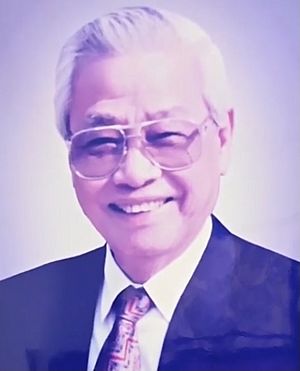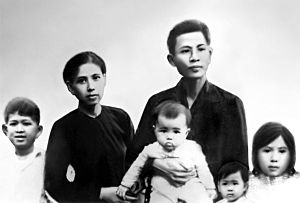Võ Văn Kiệt facts for kids
Quick facts for kids
Võ Văn Kiệt
|
|
|---|---|

Official portrait, 1997
|
|
| 4th Prime Minister of Vietnam | |
| In office 24 September 1992 – 24 September 1997 |
|
| President | Lê Đức Anh |
| Deputy | Phan Văn Khải |
| Preceded by | Đỗ Mười |
| Succeeded by | Phan Văn Khải |
| Chairman of the Council of Ministers (acting) |
|
| In office 8 August 1991 – 24 September 1992 |
|
| Preceded by | Đỗ Mười |
| Succeeded by | Himself |
| In office 10 March 1988 – 22 June 1988 |
|
| Preceded by | Phạm Hùng |
| Succeeded by | Đỗ Mười |
| First Deputy Prime Minister of Vietnam | |
| In office 23 April 1982 – 8 August 1991 |
|
| Prime Minister | Phạm Văn Đồng Phạm Hùng Đỗ Mười |
| Preceded by | Tố Hữu |
| Succeeded by | Phan Văn Khải |
| Chairman of the State Planning Commission | |
| In office April 1982 – March 1988 |
|
| Preceded by | Nguyễn Lam |
| Succeeded by | Đậu Ngọc Xuân |
| Personal details | |
| Born | 23 November 1922 Vũng Liêm, Vĩnh Long |
| Died | 11 June 2008 (aged 85) Mount Elizabeth Hospital, Singapore |
| Political party | |
| Spouse | Phan Lương Cầm |
Võ Văn Kiệt (23 November 1922 – 11 June 2008) was an important Vietnamese politician. He served as the Prime Minister of Vietnam from 1991 to 1997. He was known for helping to change Vietnam's economy.
Võ Văn Kiệt was a brave leader during Vietnam's long wars. He fought against French rule and later against American forces during the Vietnam War. After the wars, he was a key leader in the Đổi mới (meaning Innovation) policy. This policy helped Vietnam's economy grow and opened the country to the world. During his time as Prime Minister, Vietnam became more connected globally.
Contents
Who was Võ Văn Kiệt?
Võ Văn Kiệt was born Phan Văn Hòa in 1922. His family were farmers in a village called Trung Hiệp. This village was in the Mekong Delta region of southern Vietnam. At that time, Vietnam was part of French Indochina.
He changed his name to Võ Văn Kiệt when he joined the Indochinese Communist Party in 1939. He also had a secret name, Sáu Dân. He joined a youth movement against foreign rule. He took part in a local uprising in his home district.
His Journey in Politics
Võ Văn Kiệt was part of the Viet Minh movement. This group fought for Vietnam's independence. He fought against French colonial powers in the First Indochina War (1946–1954). After this war, many communist fighters moved to North Vietnam. But Võ Văn Kiệt stayed in the South. He moved between secret bases. Sadly, his first wife and two children died in a rocket attack in 1966.
In 1960, he became a member of the Communist Party Central Committee. He led communist forces in the area around Saigon. After North Vietnamese forces took control of Saigon in 1975, he helped manage the city. In 1976, he became the city's leader. The city was renamed Ho Chi Minh City to honor the late leader.
Economic Challenges and Reforms
After the war, South Vietnam's economy faced many problems. American investments left, and the government's strict rules made things worse. People in Saigon, once a busy city, struggled to find food. As the city's leader, Võ Văn Kiệt saw that the old economic system was not working. He quietly supported trade and manufacturing outside the government's strict plans. He became a strong supporter of economic changes within the party.
In 1982, he became a Deputy Chairman of the Council of Ministers. He also led the State Planning Commission. In 1987, he became the First Deputy Prime Minister. He even served as Acting Prime Minister for a few months in 1988.
Becoming Prime Minister
Võ Văn Kiệt was elected Prime Minister in 1991. He held this important job until 1997. During his time, the government's power grew. He started many economic changes. He also worked to build stronger relationships with other countries. In the early 1990s, Vietnam's economy started to get better.
In 1995, Vietnam joined ASEAN. This group helps countries in Southeast Asia work together. Vietnam also started friendly relations with the US again. This ended 20 years of conflict and trade restrictions.
Võ Văn Kiệt believed in more economic freedom. He wanted to privatize some state-owned businesses. He also supported more democracy. These ideas were sometimes criticized by others in the party. In 1997, he and other top leaders stepped down. They continued to advise the party until 2001.
Later Years and Passing
After leaving his political roles, Võ Văn Kiệt lived in Ho Chi Minh City. He often spoke out on important issues. Many saw him as a protector of people's rights.
He was one of the highest-ranking former officials to openly talk about making peace with Vietnamese people living outside the country. He also spoke against plans to expand Hanoi and tear down historic buildings.
Võ Văn Kiệt passed away on June 11, 2008, at the age of 85. He died in Singapore.
His Funeral
The Vietnamese government announced a state funeral for him. It was held on June 14 and 15, 2008. Thousands of people attended the services in Ho Chi Minh City, Hanoi, and his home province of Vĩnh Long.
Many people lined the streets of Ho Chi Minh City to honor him. The head of the Communist Party, Nông Đức Mạnh, spoke at the memorial service. He said Võ Văn Kiệt was a great loss to the country. He praised his courage to think and act. He said Võ Văn Kiệt helped lead Vietnam out of its economic crisis.
Võ Văn Kiệt's coffin was covered with Vietnam's red flag. It was carried through the city streets in a procession of military vehicles. He was then cremated.
The current Prime Minister, Nguyễn Tấn Dũng, called Võ Văn Kiệt "a wholehearted, loyal, irrepressible and heroic revolutionary." He said Võ Văn Kiệt dedicated his life to the country and its people.
His Legacy
Võ Văn Kiệt played a huge role in Vietnam's economic changes in the 1990s. He helped Vietnam reconnect with the world after many years of being isolated. Even after leaving office, he continued to speak out for more freedom. Vietnam joined the World Trade Organization in 2007. The country's economy grew a lot during this time.
Võ Văn Kiệt once said, "The motherland belongs to us, the nation belongs to us, the state belongs to us, Vietnam belongs to us, not to communists or any religious group or faction." He also said, "When mentioning the [Vietnam] war, a million people feel happy but another million feel miserable." These quotes show his thoughts on national unity and the impact of war.
See also
 In Spanish: Võ Văn Kiệt para niños
In Spanish: Võ Văn Kiệt para niños
 | Jessica Watkins |
 | Robert Henry Lawrence Jr. |
 | Mae Jemison |
 | Sian Proctor |
 | Guion Bluford |


